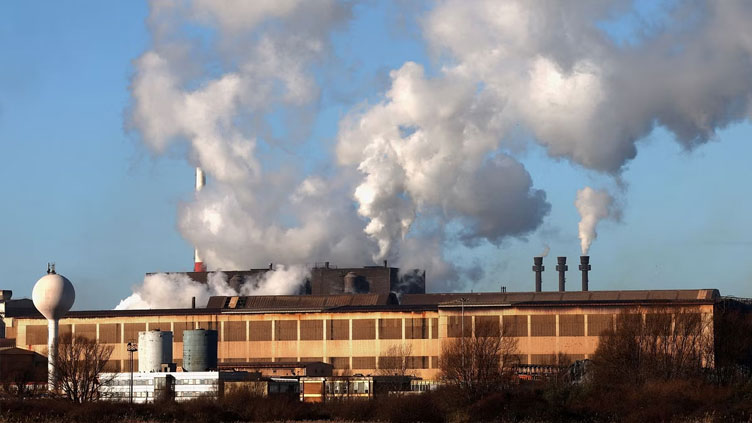COP28 climate dispute: what are 'unabated' fossil fuels?

World
Definition of 'abated' or reduced emissions unclear
OSLO (Thomson Reuters Foundation) - When countries meet for the COP28 climate summit in Dubai in late November, seeking to hasten a shift from fossil fuels, one ill-defined word is likely to stir a lot of rancour: "unabated".
"Unabated" emissions happen when fossil fuels are burnt and the emissions end up in the air, adding to accelerating global warming - which is the common practice today.
"Abating", or reducing, those emissions would require restrictions such as technologies to capture and bury carbon dioxide and other planet-heating gases released from activities such as coal-fired power production.
At last year's climate summit in Egypt, COP27, almost 200 nations confirmed their intention, first agreed at COP26 in 2021, to accelerate efforts "towards the phasedown of unabated coal power". Coal is the most polluting fossil fuel.
Now, in the run-up to the COP28 conference in the United Arab Emirates (UAE) from Nov. 30 to Dec. 12, many nations favour a stronger, broader commitment to "phase out" all "unabated fossil fuels" - coal, oil and natural gas. But there is no agreement yet on what "abated" means.
Here's a look at key issues for COP28:
WHAT EXACTLY ARE "ABATED" FOSSIL FUELS?
"Nobody knows," said Gerrit Hansen, a climate policy expert at the German Institute for International and Security Affairs. "And that's the trick. It's intentionally ambiguous."
The haziness of "unabated" is politically advantageous, as it offers a potential compromise between nations that want an immediate shift to cleaner energy and others that see themselves remaining heavily dependent on coal and other fossil fuels.
But a fuzzy definition of "abated" means nations dependent on fossil fuels might be able to argue that "even a 1% reduction in emissions would qualify as 'abated'," Hansen said.
"That would obviously not make any sense" for limiting climate change, he added.
A loose definition risks the world breaching 1.5 degrees Celsius (2.7 Fahrenheit) of warming above pre-industrial times in coming years, a level top scientists see as a guardrail against the worst impacts of climate change.
Strict limits on emissions, by contrast, could help keep the 1.5C target in reach. Fossil fuels account for about 80% of world energy use.
WHICH NATIONS FAVOUR WHAT DEFINITIONS OF ABATEMENT?
Governments will enter COP28 sharply divided over abatement, dates and targets for cutting dependence on fossil fuels.
A "high ambition coalition", for instance, laid out a plan a month before COP28 to "phase out fossil fuel production and use" entirely.
The coalition, including small island developing states such as Tuvalu and Grenada along with France, Kenya, Colombia and New Zealand, said technologies to "abate" emissions only exist at a limited scale and will "have a minor role to play".
By contrast, fossil fuel producers such as Saudi Arabia and Russia, summit host the UAE and coal-dependent nations such as India and China favour vaguer language.
A pre-summit note by the UAE, for instance, sought a world "working towards an energy system free of unabated fossil fuels by mid-century, with coal being a priority".
Leading industrialised democracies in the Group of Seven rich nations this year called for a "global effort to accelerate the phase-out of unabated fossil fuels to achieve net zero in energy systems by 2050".
The United States wants to phase out unabated fossil fuels, while also promoting carbon capture and storage (CCS) technology.
The EU wants to phase out unabated fossil fuels and achieve an energy sector "predominantly free of fossil fuels well ahead of 2050". But "predominantly" is open to interpretation and reductions could run from a little over half to almost 100%.
Some environmental groups have expressed exasperation over what they see as a semantic fig leaf for continued dependence on fossil fuels, with too much hope placed in CCS.
"We're focused on getting rid of fossil fuels altogether, without weasel words," said Doug Parr, UK policy director for Greenpeace.
ARE THERE ANY DEFINITIONS OF "ABATED" AND "UNABATED"?
A footnote in a 2023 report by the Intergovernmental Panel on Climate Change, a group of scientists and governments, says abatement should "substantially reduce" greenhouse gas emissions.
It mentions "for example, capturing 90% or more carbon dioxide from power plants, or 50–80% of fugitive methane emissions from energy supply". Methane is the main component of natural gas.
Some scientists are working to pin down strict definitions.
"The term 'unabated', if left unchecked and poorly defined, could leave the interpretation of the commitment wide open," noted a 2023 working paper by scientists led by Christopher Bataille at Columbia University.
Bataille and co-authors propose the word "abated" should only be used when fossil fuel emissions are reduced by 90-95%, for instance with CCS or technologies to suck greenhouse gases from the air.
At the same time, tighter regulations should aim to limit leaks of methane to near zero. Nations such as Turkmenistan and Russia lose vast amounts of methane to leaky infrastructure.
With people facing ever more extreme heatwaves, storms, floods and wildfires, Bataille said time is running out to set standards, especially for new coal-fired power plants and other industrial facilities.
"Progress is very slow and faltering," he told the Thomson Reuters Foundation. "These facilities are not like cars - once they are built they are likely to be operating past 2050. You have to be building at state of the art today."


